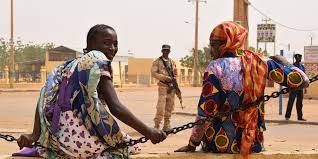Cattle Settlement Policy and Nigeria’s troubled Federation: Ethno-religious Politics through other means
Main Article Content
Abstract
This article argues that the policy of the federal government of Nigeria in establishing settlement for herders who are mostly Fulani in different states of the country is perceived by other ethnic groups as advancement of ethnic and religious politics. This perception has led to counter ethno-religious narratives with accompanying increased tensions for the country. Ethno-religious politics has not only become the defining character of Nigerian federation overtime but its continuous unbridled expression, manifestation and dire consequences are currently threatening the existence of the country as a sovereign polity. This article through qualitative secondary data from media reports, scholarly articles, government publications and internet resources examines the Cattle Settlement policy, its merits and demerits within the context of a troubled federation. The article concludes on ways of resolving the emerging crisis through proper framing of the policy for wide acceptability taking into cognizance the diversity that defines the country’s existence and the need to pursue enduring peace in the polity.
Article Details
All writings published in this journal are personal views of the authors and do not represent the views of this journal and the author's affiliated institutions. Author(s) are retain the copyrights of the Article. However, before publishing, it is required to obtain written confirmation from Author(s) in order to ensure the originality (Author Statement of Originality). The statement is to be signed by at least one of the authors who have obtained the assent of the co-author(s) where applicable.This work licensed under a Creative Commons Attribution-ShareAlike 4.0 International (CC BY-SA 4.0)
References
Akinsanya, A. (2014). “Nigeria’s intergovernmental relations under the 1999 Constitution.” In Akinsanya, Adeoye, and John, Ayoade, eds. Readings in Nigerian Government and Politics. Ibadan: New Generation Books.
Alao, A. (2007). Natural resources and conflict in Africa: the trajectory of endowment”
Assobie, A. (1997). “Centralising trends in Nigerian federalism.” In. Babawale, Tunde, Olufemi, Kola, and Adewumi, Funmi, eds. Re-inventing Federalism in Nigeria: Issues and Perspectives. Lagos: Friedrich Ebert Foundation.
Bello, M. (2013). “Conflict between transhumanist Pastoralists and Farmers in Nigeria: the way out”. www.com2wordpress/2013/06/11
Bentley, A. (1908). The Group as an Actor of the State, Colorado: Colorado Spring.
Blondel, J. (1969). An introduction to comparative government. New York: Praeger Publishers
Bord, R., & Stauffer, T. (eds). (2001). Intergovernmental fiscal relations in fragmented societies. Munich: Institute the federalism, Fribourg.
Butenschen, N., & Stiansen, O. (eds). (2015). Power-Sharing in Conflict-Ridden Societies, Challenges for Peace and Stability. Farnham.
Folami, O. (2010). “Climate change and inter-ethnic: between Fulani herdsmen and host communities in Nigeria” a paper presented at a conference on climate change and security organized by the Norwegian Academy of Social Sciences and Letters on the occasion of 250 years anniversary.
Ikechukwu, O. (2019). “Ango Abudulahi’s Terror and tenure”. This Day Live, July 17
Jinadu, A. (1979). “A note on the theory of federalism” In Akinyemi, Bolaji, Leo, Dare, and Ofonagoro, Walter, eds. Readings on Federalism. Lagos: NIIA
Kincard, J. (2001). Economic policy making: advantages and disadvantages of the federal model. International Social Sciences Journal, (167), 86-90.
Kincard, J., & Anwah, S. (2008). The practice of Fiscal Federalism Comparative Perspective, MQUP.
Michels, R. (1911). Political Parties: A Sociological Study of the Oligarchical Tendencies of Modern Democracy, Veriag Von Dr. Werner Winkhardt
Mosca, G. (1939). The Ruling Class. New York: Mc Graw – Hill Book Company.
Nigeria Infopedia, “Sokoto has the highest poverty level in Nigeria”, https;//nigeriainfopeadia.com.ng, accessed 11/02/2020, 1.30pm.
Ogbeh, A. (2018). “Cattle colonies, ranches, as panacea to farmers-herders crisis”. Daily Trust, January 14.
Okereka, O. P. (2015). Understanding the Thrust of Group Theory and its Applicability to Contemporary Party Politics in Nigeria. Public Policy and Administration, 5(5), 99-105.
Onah, E. (2010). Contemporary Political Analysis. Lagos: Concept Publication.
Roskin, M. G., Robert, L. C., & James, A. M. (2010). Political Science: An Introduction. Boston: Pearson Longman.
Sahara Reporters June 02, 2019. Herdsmen laying siege on south-west states, planning collusion with Nigerian police-YCE, https//sharareporters.com/2019/06/02/herdsmen-laying-siege-south-west-states-planning-collusion-nigerian-police%E2%8094yce
Sturm, R. (2015). Der deutsche Foderalismus. Grundlagen-Reformen-Perpektiven, Baden-Baden
Sturm, R. (2016). Federalism as a model for successful policy making and a challenge to governance http://www.hss.de downloaded 31/08/2019, 10.53pm.
The Punch, January 20, 2018
This Day Live, July 17, 2019
Varma. S. P. (1982). Modern Political Theory. New Delhi: Vikas Publishing House
Weingast, B. (1995). The economic role of political institutions: market preserving federalism and economic development. Journal of Law, Economic and Organisation, 2(1), 1-31.
Williams, O. (1985). The economic institutions of capitalism, New York: Free Press.
Wright, D. (1978). Models of national, state and local relations in America, pp. 75-88.
